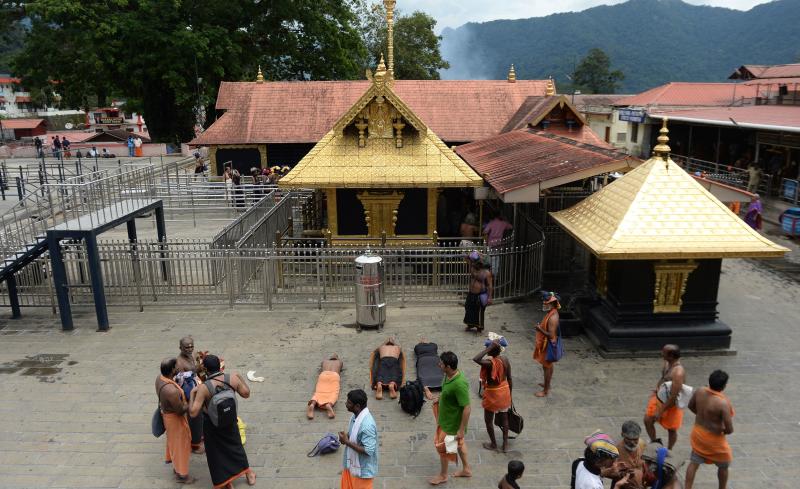Why India's flashpoint temple, Sabarimala, is off limits to women
Sign up now: Get insights on Asia's fast-moving developments

Two women created history by entering the Hindu temple of Sabarimala on Jan 2, 2019, smashing a longstanding practice to bar women from entering the temple.
PHOTO: AFP
Follow topic:
THIRUVANANTHAPURAM (AFP) - Two women in their 40s defied traditionalists on Wednesday (Jan 2) to enter the Sabarimala temple, one of Hinduism's holiest sites, sparking violent clashes in southern India.
It was the first time that women aged between 10 and 50 entered the site in the southern state of Kerala since India's Supreme Court overturned a ban in September.
Here follows some background on the temple and the landmark verdict.
GOLD-PLATED
The gold-plated Sabarimala Sree Dharma Sastha Temple complex sits atop a 915m hill in a forested tiger reserve.
It contains a shrine to Lord Ayyappa, believed to have been the Earth-born son of two of Hinduism's three main gods, Vishnu (in his female avatar) and Shiva.
Legend has it that Ayyappa was found abandoned as a baby. A king of the Pandalam dynasty, which is still active in temple operations, found and raised him.
At 12, Ayyappa revealed his divinity when he emerged from the forest riding a tigress. The boy fired an arrow which landed at the site where the temple now stands.
NO SEX OR SHAVING
Those wishing to visit undergo a 41-day period of introspection and detachment known as vratha abstaining from sex, meat, intoxicants and even shaving.
After this period many devotees, wearing ritual bead necklaces, walk barefoot for dozens of kilometres including, and especially, the final steep climb.
Only those who have observed the vratha and carry the irrumude, a symbolic offering, can enter the main courtyard up 18 divine golden steps.
The sacred offerings, tied in a cloth usually carried on the head or shoulders, include coconuts, rose water, rice and pepper.
MARRIAGE PROPOSAL
Legend says that the goddess Malikapurathamma asked Ayyappa to marry her. He said he would only do so if first-time devotees decide not to visit him - which has never happened.
Worshippers celebrate a festival each year when a procession of the goddess is taken to a spot close to the temple three times - and she is forced to wait.
The reason for Ayyappa's refusal is because of his celibacy - one of the arguments against allowing women of menstruating age to enter.
The ban lifted by the Supreme Court also rested on the belief - not exclusive to Hinduism - that menstruating women are impure.
Women can however access most other Hindu temples in India. Their entry at Sabarimala was taboo for generations and formalised by the Kerala High Court in 1991.
LEGAL WRANGLINGS
The Supreme Court order is opposed by supporters of Prime Minister Narendra Modi's Hindu nationalist Bharatiya Janata Party (BJP).
It was one of a string of recent decisions to have eaten away at some of India's traditions, including outlawing bans on gay sex and adultery last year.
The BJP is not in power in Kerala. Instead the state is run by a coalition of left-wing parties which have said they will enforce the court ruling.
But efforts by women to enter the temple in recent months have been angrily rebuffed by Hindu devotees, with police having to step in to escort the women away to safety.
In October, devotees clashed with police who arrested more than 2,000 people.
On Tuesday, tens of thousands of women formed a human chain across Kerala to back the demand for access to the temple. Media reports said some were heckled by right-wing activists.
On Nov 13, the Supreme Court agreed to hear challenges to its decision from Jan 22, but said that until then its September ruling stood.

